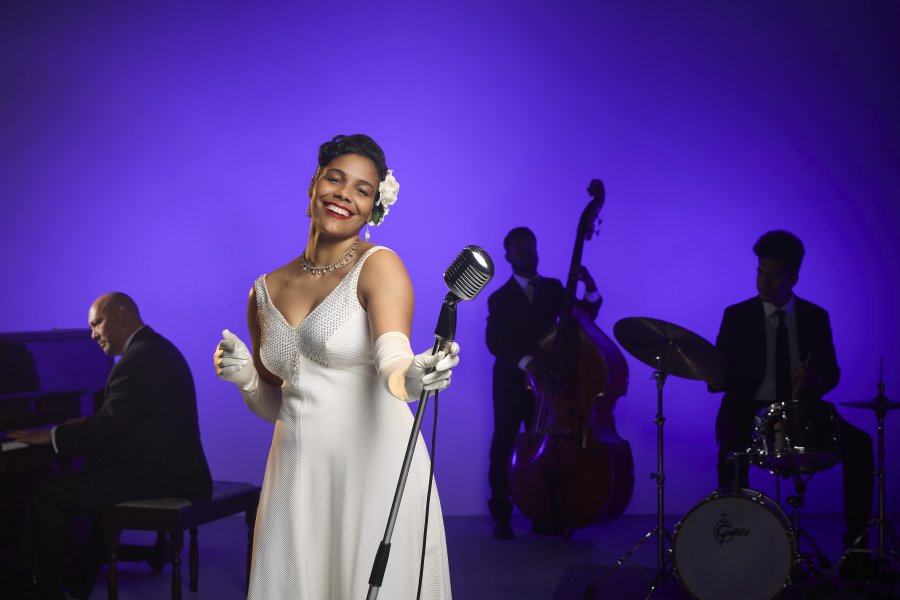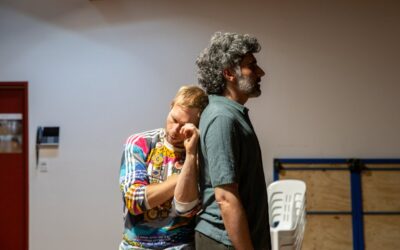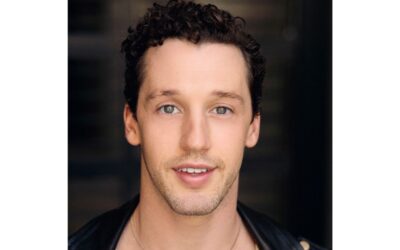Zahra Newman steps into the iconic role of Billie Holiday this month performing in Belvoir’s Lady Day at Emerson’s Bar & Grill.
Newman, who was very attracted to the project initially because of the inherent creative and technical challenge, says to portray a figure from history, who lives strongly within the cultural memory can be intimidating. Additionally, the confluence of technical skills required to perform a monologue with songs over 90 minutes was something she wanted to attempt.
“On a macro level, I think Billie Holiday is a compelling figure from history, not only because of the personal challenges she faced, but also because of the way she influenced and shaped jazz musicians, as well as the broader socio-political moment,” says Newman. “I think there may be a generation of younger people who might not necessarily know some of those things about Billie; she might be sidelined in favour of more recognisable figures from the civil rights movement. But I always like to highlight that she was singing Strange Fruit in the 1930’s – well before the more popularised political events of the 1960’s.”
Holiday was an icon of her time and beyond, and for Newman there is an immense amount of pressure and responsibility – from within and without – to get it right. “I think if you get too bogged down in expectations, you can inadvertently inhibit yourself,” she says. “Mostly I think it’s about trying to find a balance between respecting the idiosyncrasies and recognisable characteristics of Billie Holiday, while also acknowledging that I’m not magic, I will never be the ‘actual’ Billie, and collectively the creative team have an overarching goal to craft a dramaturgical arc for the evening that is compelling and satisfying.”
Overall, the creatives have been conscious of not wanting to seem exploitative, particularly of some of the personal trials Holliday endured. “We also don’t want to shy away from them. In that respect, I’ve tried to find moments that honour her humanity, skill, creativity and humour, hopefully producing a 3 dimensional portrayal rather than an ‘idea’ of someone in Billie’s circumstance.”
Newman knew some of Holiday’s catalogue before starting the project, and certainly knew about the socio-political context of Strange Fruit ( a haunting song protesting the lynching of Black Americans.) Newman had read her autobiography in her early twenties but believes what has deepened for her is knowing and appreciating just how much Holiday influenced jazz music and singers. “Her phraseology and tone, how she ultimately conveyed the lyrics and stories of songs continue to be a source of deep research today.”
Holiday’s autobiography was a starting point for Newman’s research during this process, and continues to be a source she returns to throughout the tour. Newman says other research was much more technical and involved sourcing and listening to many, many hours of her singing as well as speaking.
“That was a slightly maddening process which involved lots of repetition. There isn’t a huge amount of material that reflects Billie speaking candidly, or in informal settings. The majority of speaking sources are interviews which in and of themselves are constructions; the interviewee is aware they’re being assessed or judged and has an aim to convey a perception of themselves. So the few sources that captured her as herself, unburdened by expectation were incredibly valuable. It’s surprising in some interviews to hear her self-analyse – she often stated that she didn’t have a ‘legitimate’ voice. I was also struck by how, as a child, she was attracted to playing rough with some of the boys in her neighbourhood, and couldn’t understand the perception from adults that she should be more demure or ‘lady like’. She was also quite attracted to boxing and it seems from her autobiography got into a few stoushes in her youth.”
Newman describes the show as running the gamut of celebration, gig and biography; it’s a window into Holiday that perhaps you might not always get from just listening to her records. It could be described as ‘an evening with Billie Holiday on what might be her last performance before she passed.’ It includes biographical information about her life and experiences, reveals some perhaps lesser known truths, but also has a dramatic arc for the particular evening on which we meet Billie.
Some themes explored in the show include longing, loyalty, loss, triumph, joy and of course tragedy, all delivered with a healthy dose of dark humour. “I think ultimately (and this comes out in her autobiography), Billie never saw herself as a victim, and always had an edge to the way she described hardship in her life.
I think in terms of her legacy, the way she is remembered is unique and different for everyone. She had profound effects on people through her music and voice that I think are probably deeply personal. She said it best herself, pointing out ‘I’ve been told that nobody sings the word ‘hunger’ like I do. Or the word ‘love’.”
Newman says Holiday’s 1944 hit ‘Don’t Explain’ – which was inspired by the infidelity of her first husband, Jimmy Monroe – is probably her favourite Holiday song, mostly because of the complexity of emotions within the content. Forgiveness and reprimand, strength and frailty all wrapped up in one beautiful bundle.
Newman’s favourite number to sing changes week to week. During rehearsals it was ‘Deep Song’, now during performances she’s been enjoying ‘What A Little Moonlight Can Do’ and “Gimme A Pigfoot and a Bottle of Beer’ (which is actually a Bessie Smith song she covered)
The most challenging aspect for Newman is being physically and technically on and ready each night to go. “Once that train starts it does not stop, and you really rely on your body and voice to be there for you. Also I’d say to find the balance between honouring the memory and 3 dimensional reality of someone’s life within the context of a 90 minute theatre show that has dramaturgical requirements.
The most joyous part is recognising each night before I head onstage that I’m incredibly lucky and honoured to have the privilege to portray someone as complex and feisty as Billie Holiday. It’s once in a lifetime sort of stuff.”
As an actor, Newman likes to inhabit a range of characters – ones who surprise themselves or behave in ways they wouldn’t have imagined is always fun. She also loves a villain.
“I like telling stories that move people in some way, even if it’s incredibly miniscule. I feel like people should come out of the theatre feeling changed somehow, in small and/or big ways.”
March, 1959, around midnight. Billie Holiday is on stage in a small, run-down bar in South Philadelphia. Struggling with addiction and ill health, it is one of Billie’s final shows.
September 14 – October 15
LADY DAY AT EMERSON’S BAR & GRILL – Belvoir St Theatre
Image: Matt Loxton





